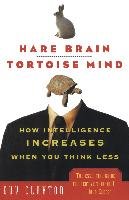"Backs up anecdotal studies of creativity with up-to-date Information about the latest research into brain function... a fascinating book." -Anthony Storr, author of Solitude: A Return to SelfIn these accelerated times, our decisive and businesslike ways of thinking are unprepared for ambiguity and paradox, and we've lost our appreciation for the value of "sleeping on it." We assume that the quick-thinking hare brain will beat out the slower intuition of the tortoise mind. But new research in cognitive science is changing this understanding of human mental processes. It suggests that patience and confusion-not rigor and certainty-are the essential precursors of wisdom.With a compelling argument that the mind works best when we trust our unconscious, or "undermind," psychologist Guy Claxton makes an appeal that we be less analytical and let our creativity have free rein. He also encourages reevaluation of society's obsession with results-oriented thinking and problem-solving under pressure. Packed with interesting anecdotes, a dozen puzzles to test your reasoning, and the latest related research,Hare Brain, Tortoise Mindis an Illuminating, uplifting, stimulating read that focuses on a new kind of well-being and cognition."The essential guide to creative thinking." -John Cleese"His multidisciplinary approach is beautifully executed." -Kirkus Reviews"Counterintuitive... provocative... While Claxton speaks the language of cognitive science, his ideas resonate with Freud's description of the unconscious, Buddhist concepts of the divine ground of existence and the great Romantic poets' notions of the fount of creativity." -Publishers Weekly

